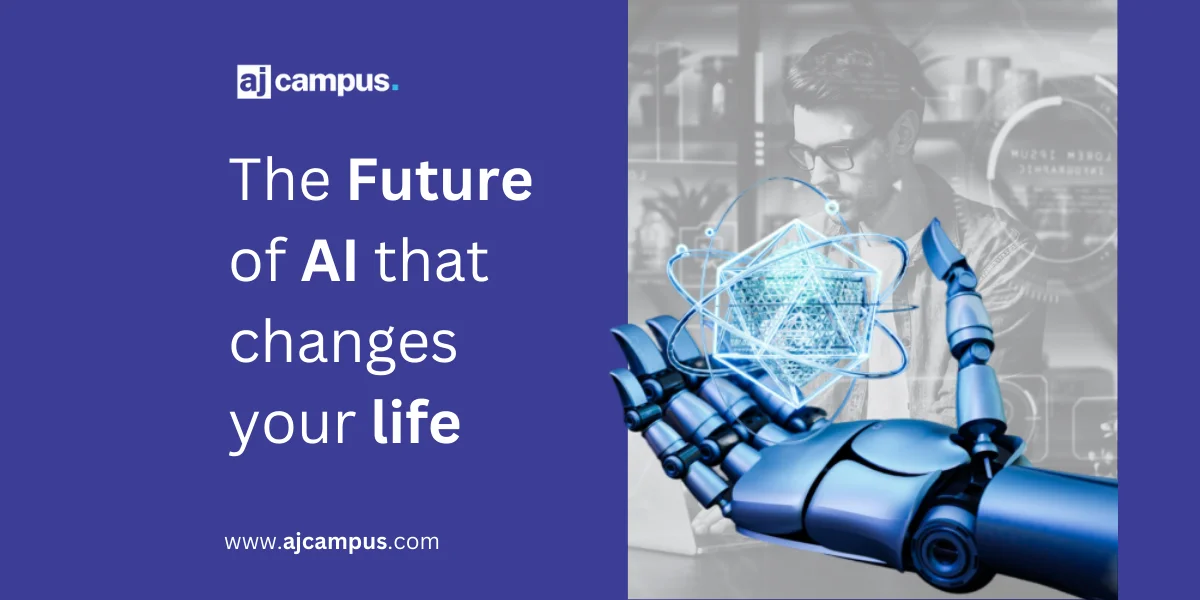The Future of AI that changes your life
By Asha Rani, Last Updated 13 Oct, 2023 4 min read

The Rise of Artificial Intelligence (AI) and its Impact on the Future of Work
Introduction about the future of AI that changes your life :
Artificial Intelligence (AI) is no longer just a futuristic concept; rather, it is becoming a powerful force influencing both the business and educational landscapes of the present and future. The confluence of data proliferation, machine learning skills, and technical developments is transforming businesses and educating a new generation of workers for a dynamic, AI-driven workplace and this will make the future of AI that changes your life.
Artificial Intelligence in Corporate World:
The emergence of AI in business is a game-changing development that has an impact on all facets of corporate operations. Reducing workloads and allowing human resources to concentrate on high-value, strategic tasks are being achieved through automation of repetitive operations, data analysis, and decision-making processes. Companies are using AI applications to streamline operations, cut costs, and obtain a competitive edge in a variety of industries, including supply chain management, marketing, finance, and customer service.
Developing Intelligence in Humans:
The integration of artificial intelligence (AI) in the corporate world aims to enhance human intelligence rather than replace it, despite concerns about widespread job displacement. Artificial intelligence (AI) technologies are intended to be a symbiotic partnership where humans contribute creativity, emotional intelligence, and critical thinking, and computers perform repetitive, data-intensive activities. By combining human and AI system capabilities, this collaborative method is promoting a work environment that maximizes overall efficiency and creativity through a synergistic effect.
You should also get information about “Importance of BCA in the Digital world“.
Increasing Corporate Workforce Skill Levels:
It is more important than ever to up skill the current workforce as AI gets more and more integrated into the corporate environment. Workers must become proficient in AI development, machine learning, and data science in order to successfully navigate the changing job market. In order to guarantee that their personnel is not only able to adjust to technological advancements but also fully utilize artificial intelligence tools, progressive organizations are planning extensive training programs.
Career Development in the Business Sector:
AI integration is changing the nature of traditional job positions and generating a need for a hybrid workforce with both technical expertise and critical soft skills. Routine, repetitive jobs can now be mechanized, but roles requiring creativity, emotional intelligence, and critical thinking are becoming more and more in demand. Professional roles are changing in the business world, and this highlights the necessity for workers who can combine cutting edge technology with what makes humans special.
AI in Education and Preparation for the Technical Workforce:
The emergence of AI offers a world full of potential and difficulties for students preparing to enter the technological industry. Academic establishments are crucial in equipping learners for a future in which artificial intelligence will be an integral aspect of the workforce. AI-related courses must be added to curricula in order to guarantee that graduates have the skills required by the changing labor market in addition to being technically competent.
The Importance of Ethical AI Education:
It is critical to comprehend the ethical implications of artificial intelligence (AI) as the workforce of the future becomes ready to use these technologies. Education must prioritize responsible AI development and application over merely imparting technical knowledge. To effectively negotiate the complex considerations involved in AI creation and execution, students must be prepared with the ethical frameworks. It is imperative that the next generation of professionals focus ethical issues in order to ensure that AI technologies be developed responsibly.
For more key learnings must visit “Top 10 advantages of partnering with Admission Jockey“.
Collaborative learning and internships:
Collaborative efforts, internships, and the ability to bridge the knowledge gap between academics and practitioners are becoming more and more crucial. Students receive a great deal of practical experience and understanding of industry needs by being exposed to AI applications in corporate settings. This partnership facilitates a more seamless transfer from academic settings to the fast-paced, technologically advanced business sector, guaranteeing that graduates are equipped to take advantage of the opportunities and difficulties brought about by the AI revolution.
Challenges and Considerations:
The development of AI has enormous promise, but there are drawbacks as well that should be carefully considered. Automation-related job displacement, moral dilemmas with biased algorithms, & the ongoing need for upgrading are a few of the issues that need to be resolved. Governments, corporations, and academic institutions need to collaborate to create policies that strike a balance between worker welfare and innovation.
Downsides :
Artificial intelligence’s (AI) growth is not without its problems, despite its promise to revolutionize. One big worry is that jobs could be lost when normal, repetitive tasks are replaced by automation and AI-driven technology, which would need upgrading and workforce restructuring. Transparency and ethical AI development are further issues brought up by the ethical ramifications of AI, which include biased algorithms and the possibility of privacy abuses.
AI advancements raise concerns about job displacement, as automation takes over routine tasks, potentially leaving some unemployed. Re-skilling initiatives are crucial for workforce adaptation, highlighting the need for proactive measures and policies to balance AI benefits with potential job losses.
The accelerating rate of technological development might also be a factor in the growing skills gap, which would leave some workers unprepared to prosper in an increasingly digital workplace. Furthermore, obstacles to the general adoption of AI solutions include the upfront expenses involved in putting them into practice and the possibility that they would exacerbate social inequality. Finding a balance between utilizing AI’s advantages and resolving its disadvantages is a difficult task that calls for careful study, cooperation, and the creation of well-thought-out policies.
Conclusion:
Artificial intelligence is a social movement with far-reaching effects on the corporate and educational spheres. It is more than just a technical breakthrough. In the rapidly changing digital landscape, companies that adopt AI technologies and make investments in staff upgrading are well-positioned for success. To effectively navigate the hurdles and capitalize on the opportunities brought about by the AI revolution, students entering the technical industry will need to possess a blend of technical proficiency, soft skills, & ethical considerations.
An active and cooperative attitude is essential to creating a future where people and machines coexist peacefully and benefit from each other’s efforts as the business sector and academic institutions adjust to the AI era. The decisions we make now about innovation, legislation, and education will shape the nature of the workplace of the future and the broader effects of artificial intelligence on society. It’s a path of transformation that calls for teamwork, moral consciousness, and a dedication to building an AI-powered future that drives progress.




